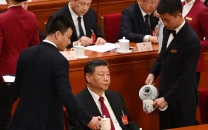Samsung denies its new Smart TVs 'spy' on customers
Samsung's smart televisions included a warning that its system intercepts speech and transmits it to third parties

Samsung stressed that it took privacy issues "very seriously" and employed numerous safeguards to prevent the unauthorised the use of consumer data. PHOTO: SAMSUNG
Anxiety that romantic murmurings or domestic rows could be picked up by the televisions was triggered by the South Korean tech giant's own Smart TV privacy policy that warned of the potential scope of the sets' voice recognition software.
Using the software means voice commands like "change the channel" are transmitted to a third-party service that converts the speech to text and then sends the command to the television.
"Please be aware that if your spoken words include personal or other sensitive information, that information will be among the data captured and transmitted to the third party," the policy said. This 'third party' has not been identified by Samsung, giving rise to fears about who the 'third party' could be in a post-Snowden world.
It's not the first time Smart TVs have been called out for potential "Big Brother" style invasions of privacy.
In 2013, another South Korean electronics conglomerate LG acknowledged that its smart TVs were collecting data about owners' viewing habits without their permission.
The company said it had fixed the problem with an update.
In a statement Tuesday, Samsung stressed that it took privacy issues "very seriously" and employed numerous safeguards to prevent the unauthorised the use of consumer data.
The statement noted that the voice recognition feature on its Smart TVs was an option - and could simply be switched off.
"Should consumers enable the voice recognition capability, the voice data consists of TV commands, or search sentences, only," it added.



















COMMENTS
Comments are moderated and generally will be posted if they are on-topic and not abusive.
For more information, please see our Comments FAQ